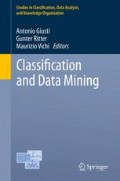Abstract
The paper illustrates a clusterwise regression procedure applied to the prediction of per capita disposal income (PCDI) in Italian municipalities. The municipal prediction is derived from the provincial PCDI taking into account the discrepancy between municipality and province in some indicators like per capita taxable income, per capita bank deposits, employment rate, etc. The relation between PCDI and indicators is shaped by a regression model. A single regression model doesn’t fit very well all territorial units, but different regression models do it in groups of them. The aim of clusterwise regression is just that: detecting clusters where the correspondent regression models explain the data better than an overall regression model does. The application of the procedure to a real case shows that a significative reduction of the regression standard error can be achieved.
Access this chapter
Tax calculation will be finalised at checkout
Purchases are for personal use only
References
Bock, H. H. (1969). The equivalence of two extremal problems and its application to the iterative classification of multivariate data. In Lecture note. Matematisches Forschungsinstitut, Oberwolfach, Germany.
Bollino, C. A., & Pollinori, P. (2005). Il valore aggiunto su scala comunale: La Regione Umbria 2001–2003. Quaderni del Dipartimento di economia, Finanza e Statistica (No. 15/2005). Universitá di Perugia.
Brusco, M. J., Cradit, J., Steinley, D., & Fox, G. J. (2008). Cautionary remarks on the use of clusterwise regression. Multivariate Behavioral Reseach,43, 29–49.
DeSarbo, W. S., & Cron, W. L. (1988). A maximum likelihood methodology for clusterwise linear regression. Journal of Classification,5, 249–282.
DeSarbo, W. S., Oliver, R. L., & Rangaswamy, A. (1989). A simulated annealing methodology for clusterwise linear regression. Psychometrika,54, 70–736.
Frale, C. (1998). Stime comunali del reddito disponibile: La provincia di Udine, Osservatorio permanente dell’economia del Friuli venezia Giulia (No. 3).
Hennig, C. (2000). Identifiability of models for clusterwise linear regression. Journal of Classification,17, 273–296.
MacQueen, J. B. (1967). Some methods for classification and analysis of multivariate observations. In Proceedings of 5-th Berkeley Symposium on Mathematical Statistics and Probability (Vol. 1, pp. 281–297). Berkeley: University of California Press.
Marbach, G. (Ed.). (1985). Il reddito nei comuni italiani 1982. In Quaderni del Banco di Santo spirito. Torino: UTET.
Preda, C., & Saporta, G. (2005). Clusterwise PLS regression on a stochastic process. Computational Statistics and Data Analysis,49, 99–108.
Spaeth, H. (1979). Clusterwise linear regression. Computing,22, 367–373.
Unioncamere Piemonte. (2009). Geografia dei redditi 2009, Osservatorio sul reddito disponibile e prodottoin Piemonte. Unioncamere Piemonte, Turin, Italy.
Zhang B. (2003). Regression clustering. In ICDM03, Third IEEE International Conference on Data Mining, Melbourne, Florida, USA, (p. 451).
Author information
Authors and Affiliations
Corresponding author
Editor information
Editors and Affiliations
Rights and permissions
Copyright information
© 2013 Springer-Verlag Berlin Heidelberg
About this paper
Cite this paper
Chirico, P. (2013). A Clusterwise Regression Method for the Prediction of the Disposal Income in Municipalities. In: Giusti, A., Ritter, G., Vichi, M. (eds) Classification and Data Mining. Studies in Classification, Data Analysis, and Knowledge Organization. Springer, Berlin, Heidelberg. https://doi.org/10.1007/978-3-642-28894-4_21
Download citation
DOI: https://doi.org/10.1007/978-3-642-28894-4_21
Published:
Publisher Name: Springer, Berlin, Heidelberg
Print ISBN: 978-3-642-28893-7
Online ISBN: 978-3-642-28894-4
eBook Packages: Mathematics and StatisticsMathematics and Statistics (R0)

